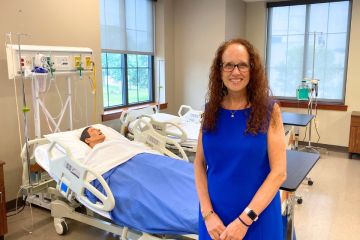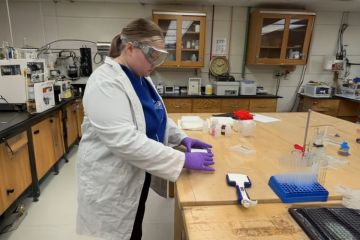Engineering Faculty Receives Funding for Cancer Research

Sachin Patil, interim dean of the School of Engineering, was awarded a grant from the W.W. Smith Charitable Trust to investigate novel cancer therapeutics. The funding is expected to reach a total of $100,000 over a two-year period in support of research to identify long-term pathways for future development of more potent and selective treatments against a variety of cancers.
Primary cancer therapies, including surgery, chemotherapy and radiation, all present serious limitations and can have harmful effects on patients. As a result, there is a significant unmet need for the development of novel, effective and non-genotoxic therapeutics against cancer.
Immunotherapy has significantly changed the way the medical and research communities approach cancer care. By harnessing the fighting power of the body’s own immune system, we are able to identify targeted treatment options for the individual patient. With this grant, my research team and I can build upon our findings to further investigate innovative therapeutics that will lay the groundwork to deliver affordable and life-saving care. —Sachin Patil
Using a novel integrated molecular screening approach, Patil, along with undergraduate engineering
students, will test a specific kind of immunotherapy that uses small-molecule inhibitory pathways.
The body’s immune system is designed to identify and eliminate abnormal cells in the body to maintain a balanced system. Certain white blood cells, known as T-cells, constantly scan the body for disease using a protein receptor known as a PD-1 protein. T-cells scan protein receptors on other cells to determine if they are abnormal or not. Those deemed abnormal signal the immune system for destruction.
Cells carrying disease typically reveal their abnormal and potentially dangerous nature. Certain cancer cells, however, carry proteins that mask their identity when interacting with PD-1 proteins. These deceptive cancer cell proteins are known as PD-L1. Current immunotherapy drugs exist to block PD-1 and PD-L1 interaction and activate the immune system to fight. These drugs, while effective, are expensive, can cause short- and long-term side effects and are slow to kill a cancerous tumor.
Patil’s research focuses on the development of small‐molecule inhibitors in order to provide an attractive alternative approach to treat tumors expressing the PD−L1 protein. Compared to current treatment options, small-molecule inhibitors are found to potentially offer several effective and inexpensive advantages. These advantages were outlined in a recent study led by Patil and published in Chemistry Select.
“Our findings reported successful structure‐based discovery of small‐molecule inhibitors of PD‐1 and PD−L1 interaction through virtual screening followed by experimental testing of select compounds,” said Patil. “This grant will allow for further investigation of our preliminary data.”
The W.W. Smith Charitable Trust is a private foundation that supports a variety of research areas including basic medical research. The Trust supports unique and meritorious research that may lead to breakthrough discoveries that will immeasurably improve lives.




